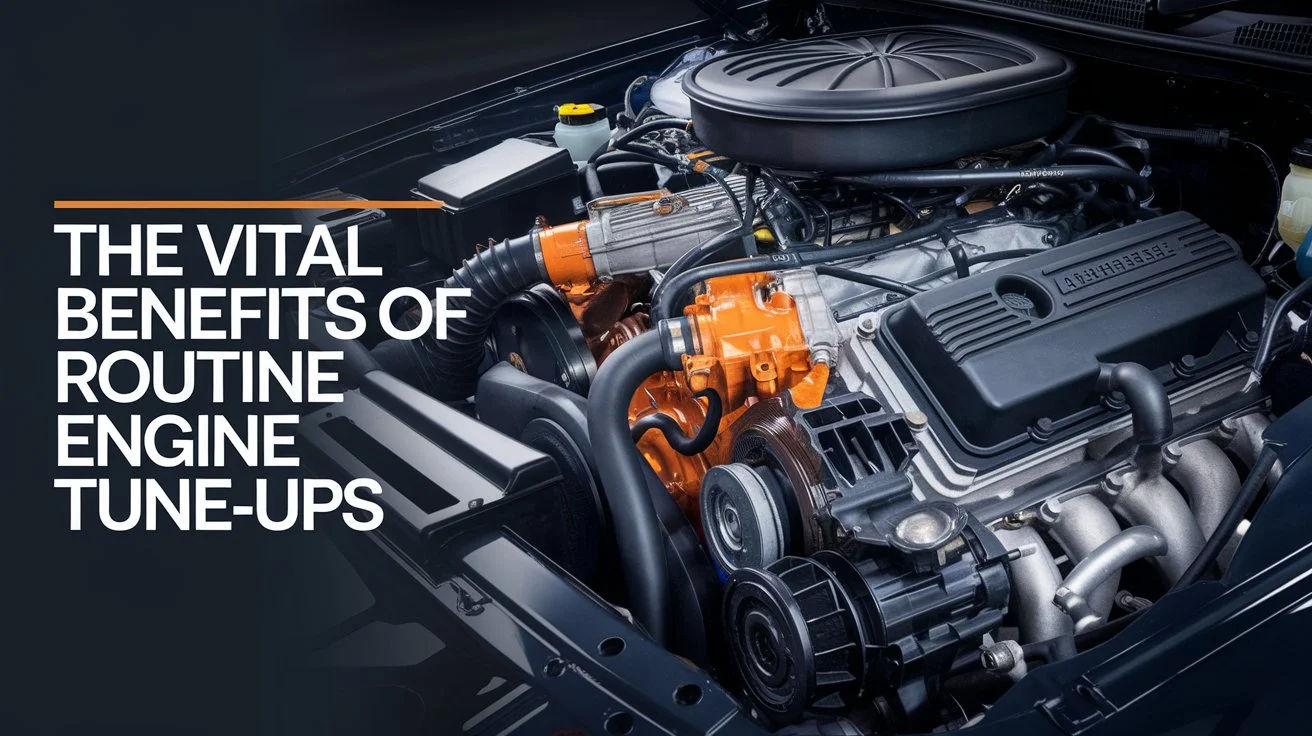 Date: November 25, 2024
Date: November 25, 2024
In today’s quickly and constantly developing world, our automobiles are indispensable for transporting us from one place to another safely. Our cars have become our constant companions for the daily commute to the office or for running errands, to long road trips. However, similar to other machines, they are required to be well-maintained so that they can work optimally. If you want to extend the life of your vehicle as well as maintain its optimum condition, one of the most important things to do is to get your car’s engine tuned up. An engine tune-up is not just a short trip to the shop but a thorough service that adjusts your car’s engine to its best possible level of performance, fuel consumption, and durability. In this article, you will find out about the many advantages of regular engine tune-up, what it involves, and how to recognize that your car needs it.
Benefits of Routine Engine Tune-Ups
Regular engine tune-ups are crucial to keeping your vehicle in top condition. They enhance fuel efficiency, optimize engine performance, and improve safety while reducing emissions and extending engine life. Here are a few benefits of routine engine tune-ups:
1) Enhanced Fuel Efficiency
Daily check-ups for your car engine is that it increases fuel efficiency. When such parts as spark plugs, filters, and fuel injectors are well functioning, the engine will run better and consume less fuel. Lack of proper maintenance of an engine, for example, can cause a reduction in fuel efficiency by up to 20%, meaning one will have to refuel more frequently and spend more money in the long run. Tune-ups allow you to achieve the greatest gas mileage per gallon, thus saving your money at the pump and preserving the environment by lowering emissions.
2) Enhanced performance of the engine
Tune-ups ensure that the engine has the right conditions to burn fuel efficiently, which directly affects its performance. Clean fuel injectors and fresh spark plugs ensure fuel combusts as it should, delivering more power and faster acceleration. An engine that has been tuned runs efficiently to throttle and takes less time to accelerate, thus making the drive more enjoyable and less reckless. This is especially crucial if you often drive on the highways or utilize your vehicle for transporting large loads where quick acceleration is critical for security and stability.
3) Reduced Emissions
Engines that are not serviced often emit more of the pollutants, which is not very good for the environment and emission standards of the air. In an ordinary tune-up, the air filter and fuel injectors are renewed or cleaned so that they can work effectively to improve the efficiency of the engine and reduce the production of hazardous gases. Regular maintenance of an engine not only leads to less emissions but also makes your vehicle environmentally friendly and saves you from fines and restrictions.
4) Longer Engine Life
Tune-ups help mechanics check for minor problems that, if not attended to, can cause serious damage later. For example, replacing damaged spark plugs or changing the oil ensures that the engine does not accumulate wear. Such measures go a long way in ensuring that you do not have to overhaul your engine because it has already given you the required number of years of service.
5) Increased Safety
Safety is a priority, and regular service is an inseparable part of keeping your car safe. Tune-ups involve checking belts, hoses, and batteries, which are crucial in the vehicle’s running. For example, a car’s timing belt may have worn out, and this can break, leading to major engine failure or, worse, breakdown in the middle of the road. Performing regular tune-ups helps minimize some of these problems, hence making your vehicle reliable and safe.
5) Increased Safety
Safety is a top priority, and regular tune-ups play a vital role in keeping your vehicle safe. Inspections of belts, hoses, and batteries during a tune-up can prevent failures that might lead to accidents or breakdowns. For example, replacing a worn timing belt prevents catastrophic engine damage, ensuring your vehicle is dependable and secure on the road.
6) Better Resale Value
Vehicles that receive regular engine tune-ups often retain higher resale value. Proper maintenance ensures the engine runs smoothly, demonstrating to potential buyers that the car has been well cared for. A vehicle with a complete maintenance record attracts better offers and sells faster.
7) Increased Lifespan of Components
Routine tune-ups protect not just the engine but also other vehicle components. Regular inspections and timely replacements prevent excessive wear on parts like the alternator, water pump, and radiator. This ensures the entire system operates efficiently, reducing the need for frequent repairs.
8) Prevention of Major Repairs
Tune-ups allow mechanics to identify and address small issues before they evolve into costly repairs. For example, fixing a minor oil leak during a tune-up can prevent severe engine damage later. This proactive approach saves money and avoids inconvenient breakdowns.
What to Expect During a Routine Engine Tune-Up?
Sometimes, when you take your car for a tune-up, the mechanic checks adjusts or replaces some parts in the car to ensure the best performance of the car engine. Here are some of the primary services you can expect:
1) Oil and Filter Change
A tune-up involves changing the oil and a filter or replacing the filter often with a new one. New oil helps to maintain proper lubrication of the engine and minimize the rubbing of the parts within the engine. Replacing the filter means that these particles, such as dirt and debris, are kept away from such important parts of the engine. Cleaning the oil and filters makes the engine operate efficiently and helps to minimize cases of hefty repairs in the future.
2) Spark Plug Replacement
Spark plugs are small but very important components that help ignite the fuel-air mixture in the engine cylinders. Spark plugs with signs of wear and tear lead to misfires, reduced fuel economy, and compromised engine performance. To achieve optimal combustion, improved ignition, and optimal engine performance, they are recommended that they be replaced during a tune-up.
3) Air Filter Replacement
The air filter prevents dirt, debris, and other material from getting into the engine. Clogged air filters restrict air intake, which impacts fuel burning and decreases efficiency. Changing the air filter enhances the flow of fresh air to the engine to support combustion, and consequently, the engine runs smoothly and consumes less fuel.
4) Fuel Injector Cleaning
Fuel injectors spray the right measure of fuel into the engine; however, they tend to block due to deposits formed over time. Dirtier injectors allow a limited fuel supply to get through, which compromises the car’s performance and fuel economy. During the tune-up, the injectors are cleaned to ensure that fuel flows as it should to improve performance and minimize fuel usage.
5) Belts and Hoses Inspection
Belts and hoses are crucial to cooling the engine, spinning the alternator, and controlling the power steering and/or air conditioning. Mechanics check these parts for tear and wear, such as cracks or fray. Worn belts and hoses should be replaced during a tune-up to avoid breakdowns and costly repairs that may affect the engine.
6) Battery Check
The battery can supply current to start the engine and to operate electrical loads. During the tune-up, the mechanic examines the battery’s voltage, connections, and general health. This check helps to guarantee its correctness, including when the temperature is low and batteries can stop working.
Signs Your Vehicle Needs a Tune-Up
Just because you schedule your car for regular maintenance does not mean it will not show some signs that will require a tune-up sooner. Watch for the following symptoms:
1) Decreased Fuel Efficiency
If you have observed that fuel consumption has gone up significantly, this could be an indication that the engine is not working efficiently. It may be time to replace spark plugs or air filters or to clean fuel injectors. A tune-up is necessary to find the problem and fix it to restore fuel efficiency.
2) Rough Idling
Sometimes, your car shakes or produces unusual sounds while idling—rough idling is a sign of an engine or fuel system issue. These concerns can be resolved by either repairing or replacing bad parts in a tune-up that will enable the car to run more smoothly and quietly at idle.
3) Stalling or Misfiring
If your car suddenly quivers or loses power, it may be due to ignition or fuel system problems. These problems are not only irritating but may also cause an accident if they happen on the road. A tune-up can check and fix these problems so you do not experience occasional halts or misfires.
4) Reduced Power
Slower acceleration, less power or torque, or just a feeling that the car is not performing as well as before could indicate worn spark plugs, a dirty air filter, or some other item that requires attention. Bash tuning aids in regaining power and durability and makes the drive more enjoyable.
5) Unusual Noises
Rattling, knocking, hissing, or pinging are usual signs of an engine with a problem, such as bad spark plugs or belts. These sounds should not be disregarded, as they are signs of other more serious issues that need to be addressed. A tune-up will assist in finding out why there are strange sounds and prevent further damage to the engine.
